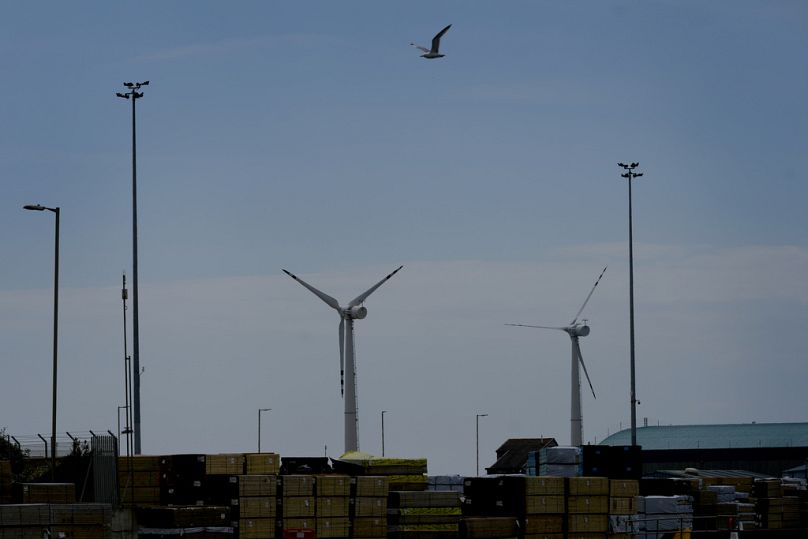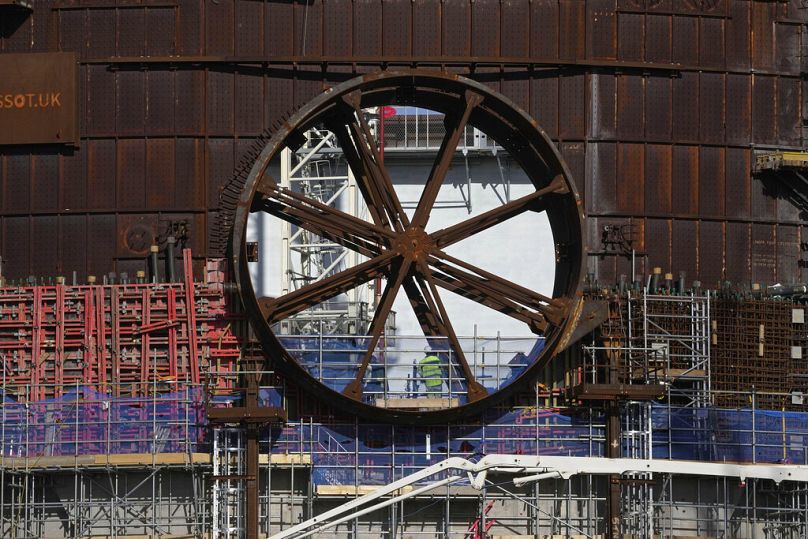
Copyright AP Photo/Euronews
By Lindsay Hooper, CEO, CISL
Published on 19/07/2024 - .
Starmer now has a window of opportunity to take action to show that the country is fully in the game as a climate and biodiversity leader. Without such leadership, businesses will remain stuck between a rock and a hard place, Lindsay Hooper writes.
After the last government became increasingly distracted from delivering for the British people, Labour’s landslide felt inevitable.
PM Keir Starmer now promises "action not words", but we must see that focus turn on the environment. It’s no longer about paying lip service — Starmer must do everything in his power to preserve the natural systems on which we all depend.
So far, Labour has hit the ground running on the energy transition — lifting the de facto ban on onshore wind, rejecting new oil and gas licenses in the North Sea and, as King Charles III laid out in his speech this week, setting up a publicly owned clean power company, Great British Energy, to encourage investment in renewables.
Yet the glaring gap is that we haven’t seen anything like this scale of action on nature and the biodiversity crisis.
This is despite the UK being one of the most nature-depleted countries in the world, with disastrous consequences for food security and nearly one in six species threatened with extinction.
Starmer and his cabinet must move quickly. Nature is intrinsic to economic growth, jobs, and national security. Unless this is acknowledged and acted on, the new government will ultimately fail to regenerate the economy and secure our nation’s future.
This link between nature and the economy was clearly set out in the game-changing Dasgupta Review in 2019, commissioned by the Treasury, which pointed out that nature is a blind spot in economics that we ignore at our peril.
But despite the weight of evidence, the change in thinking needed to incorporate restoring and protecting nature into our economic strategy has not yet happened — even though it is more and more widely understood.
From business leaders committing to be "nature positive" to trade unions warning there are "no jobs on a dead planet", protecting our natural world is not a divisive issue.
Effective government willing to act needed
Research by the Green Finance Institute (GFI) published in April 2024 shows that damage to the environment is slowing the UK economy right now and could lead to as much as a 12% reduction in GDP by the 2030s.
A 2020 study by the World Economic Forum indicated that industries either highly or moderately dependent on nature generate over a third of the world’s economic growth.
The top four perceived risks faced by economies and societies, according to the WEF’s 2024 Global Risk Report, are all environmentally related — extreme weather, critical change to earth systems, biodiversity and ecosystem collapse and natural resource shortages. Of course, all economic activity is ultimately dependent on nature.
Effective government action is needed to stop businesses profiting from undermining the environment, and to provide incentives and confidence for businesses to transition not only to secure their own futures, but to contribute to economic and societal resilience.

Wind turbines in Shoreham Port, East Sussex, June 2024
AP Photo/Kirsty Wigglesworth
Many businesses are waking up to their critical dependencies on water, on soil, on pollinators and other key "ecosystem services," and are already experiencing operational disruptions and financial costs as a result of our collective failure to protect the natural systems on which we depend.
To build greater transparency of business risks and impacts, there is a growing host of tools, regulations and frameworks, internationally and domestically, to require organisations to report on nature as well as climate, such as TNFD.
Four people to know in UK Prime Minister Keir Starmer's new cabinet
Starmer: UK will 'reset' relations with the EU
However, reporting alone will not halt the alarming disappearance of species in the UK or deliver on the global commitment to protect and restore 30% of land and sea by 2030.
Effective government action is needed to stop businesses profiting from undermining the environment, and to provide incentives and confidence for businesses to transition not only to secure their own futures, but to contribute to economic and societal resilience.
It's not just one thing
Action is also needed to drive sustainable growth. There is a huge amount of innovation going on, with new ventures launching daily that harness technologies to tackle the degradation of nature and secure food security while also creating jobs.
But without full government support, start-ups are likely to remain small and struggle to compete with incumbent but damaging business models.
While businesses are increasingly aware of the imperative for action, many are limited in what action they can take without being competitively undermined by others.
They are also hindered by the absence of any joined-up industrial and economic plans that enable collaboration to address the shared challenges of re-orienting supply chains, developing new "pro-nature" business models and changing land use patterns.
The development of new infrastructure to enable the energy transition, climate adaptation and house and transport a growing population also has major implications for nature.

Many businesses are waking up to their critical dependencies on water, on soil, on pollinators and other key "ecosystem services," and are already experiencing operational disruptions and financial costs as a result of our collective failure to protect the natural systems on which we depend.
To build greater transparency of business risks and impacts, there is a growing host of tools, regulations and frameworks, internationally and domestically, to require organisations to report on nature as well as climate, such as TNFD.
Four people to know in UK Prime Minister Keir Starmer's new cabinet
Starmer: UK will 'reset' relations with the EU
However, reporting alone will not halt the alarming disappearance of species in the UK or deliver on the global commitment to protect and restore 30% of land and sea by 2030.
Effective government action is needed to stop businesses profiting from undermining the environment, and to provide incentives and confidence for businesses to transition not only to secure their own futures, but to contribute to economic and societal resilience.
It's not just one thing
Action is also needed to drive sustainable growth. There is a huge amount of innovation going on, with new ventures launching daily that harness technologies to tackle the degradation of nature and secure food security while also creating jobs.
But without full government support, start-ups are likely to remain small and struggle to compete with incumbent but damaging business models.
While businesses are increasingly aware of the imperative for action, many are limited in what action they can take without being competitively undermined by others.
They are also hindered by the absence of any joined-up industrial and economic plans that enable collaboration to address the shared challenges of re-orienting supply chains, developing new "pro-nature" business models and changing land use patterns.
The development of new infrastructure to enable the energy transition, climate adaptation and house and transport a growing population also has major implications for nature.

An employee works at the site of a nuclear reactor at Hinkley Point C nuclear power station in Somerset, October 2022
AP Photo/Kin Cheung
Effective government action must grapple with the reality that we need to deliver for multiple outcomes.
We can’t address nature without considering agriculture and infrastructure. Industrial farming is a key reason that nature is in such a poor state, therefore any solutions implemented to protect biodiversity must also consider farmer livelihoods and crop security.
The development of new infrastructure to enable the energy transition, climate adaptation and house and transport a growing population also has major implications for nature.
Effective government action must grapple with the reality that we need to deliver for multiple outcomes.
We can’t address nature without considering agriculture and infrastructure. Industrial farming is a key reason that nature is in such a poor state, therefore any solutions implemented to protect biodiversity must also consider farmer livelihoods and crop security.
The development of new infrastructure to enable the energy transition, climate adaptation and house and transport a growing population also has major implications for nature.
'Britain is back on the European stage' as it pledges to reset relations with the EU
In other words, the government needs not just to agree and commit to high-level goals on nature but also to develop joined-up industrial, economic, infrastructure, and security strategies that will deliver for climate and nature as well as for growth, productivity, jobs, health, and security.
This will require intelligent decision frameworks and processes that can make sense of complexity and ensure relevant stakeholders are engaged and not excluded.
Between a rock and a hard place
The former Conservative government did not do enough to focus attention on nature and failed to recognise the scale of the problem.
Despite legislative progress with the passing of the Environment and Agriculture Acts and the introduction of Biodiversity Net Gain, changes in leadership and a volatile political context have meant there has been insufficient focus on implementation and delivery.
At the start of the year, the Office for Environmental Protection found that the government remains largely off track to meet its own environmental ambitions.
COP16, the next global biodiversity gathering under the auspices of the United Nations, will take place in Colombia at the end of October.
Starmer now has a window of opportunity to take action to show that the country is fully in the game as a climate and biodiversity leader at COP16 and prior to the COP29 climate summit in Azerbaijan.
Without such leadership, businesses will remain stuck between a rock and a hard place.
Lindsay Hooper is CEO of the Cambridge University Institute for Sustainability Leadership (CISL).
No comments:
Post a Comment